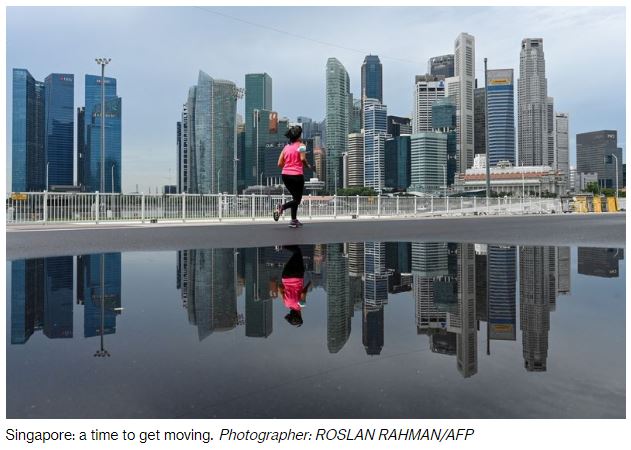A Tax Hike in Singapore Is Inconvenient but Opportune
By increasing its 7% goods and services tax, which was last raised in the go-go days of 2007, the city-state’s economy will mark a return to business as usual.
When Singapore’s goods and services tax last went up in 2007, the city’s economy was basking in the warm glow of sizzling global growth. The SARS virus had faded from public memory. The U.S. subprime mortgage crisis was still a year away. Finance was booming. Real estate was hot. Unemployment was low and falling. It was the right time to increase the levy, to 7% from 5%, to pay for a lower corporate tax rate that would almost match the level in archrival Hong Kong.
Fifteen years later, the GST is set to rise further, perhaps to 9%, but in a world ravaged by a far more stubborn pathogen. Global growth is uneven, uncertain and held back by inflationary supply shortages. Finance and real estate are still surging, but they’re propped up by an unprecedented global monetary expansion that’s now set to recede rapidly.
Singapore still faces at least two very expensive internal challenges: an aging population and climate change. Which is why it’s likely to raise the tax again in Friday’s budget, though the timing is far from convenient. Nomura Holdings Inc., which believes there’s a 55% chance of a single-shot increase effective from July, predicts core inflation to quicken to 4.3% this year from such a move, exceeding the central bank’s recently raised forecast of 2% to 3%.
The GST will add to the cost of living, and the government will help households deal with it by tapping an already-earmarked S$6 billion ($4.5 billion) fund set aside two years ago. But the impact of GST on inflation may not ebb quickly if wages firm up in a tightening labor market. The jobless rate has fallen to 2.4% and is set to drop further to pre-Covid-19 levels of around 2%. The Monetary Authority of Singapore, which uses the exchange rate to manage financial conditions, may aim for a stronger appreciation in the local currency than it has indicated so far.
Above all, though, effecting a tax increase at this delicate juncture — and making it palatable for the citizens — are good problems to have. They showcase the island economy’s resilience, and paint a picture that’s in stark contrast with Hong Kong where unemployment is 1.5 percentage points higher. The Chinese special administrative region’s annual budget next week is likely to show it stuck in the knots of a Beijing-inspired “dynamic zero” mandate for new infections, a strategy that’s proving hard to defend in the face of the fast-spreading omicron variant. Singapore has firmly closed that chapter by deciding to live with Covid-19.
When it comes to citizen services such as public housing and old-age security, Singapore already has an edge. But now it’s trumping the formerly laissez-faire Hong Kong in ease of doing business as well. From multinationals to startups, firms are taking note. Citigroup Inc. is moving some senior equity staff to Singapore and other economies. As activity in the Southeast Asian city-state start humming back to life, its market for office space is poised for a recovery, while commercial property in Hong Kong remains mired in a glut — amid a threat of even harsher lockdowns.
Both cities have dipped liberally into their vast reserves to fight the pandemic, but where Hong Kong will have to remain in crisis mode, Singapore’s policy makers have won the fiscal space for using tax policy to addressing longer-term challenges.
Government spending on health-care had tripled in the decade before Covid-19, with patient subsidies alone rising by 62% in five years to S$6.5 billion. Expect the growth to continue as the population of 5.5 million demands more and better quality of care, especially for the swelling ranks of the elderly. Almost one in every four citizens will be aged 65 years or above by 2030, from one in 10 in 2011. Last year, the government decided to raise the health-care subsidy for a three-generation household earning median income to S$10,200, a 10% increase.
Then there’s climate change. The vital business district and some of Singapore’s most valuable infrastructure is at risk of sinking. Saving the city from rising sea levels could cost S$100 billion or more over the next century. Increasing the current carbon tax rate of S$5 per ton of emissions will go some way toward mobilizing resources. But it won’t be enough.
It remains to be seen if the blow of a higher GST on ordinary people is equalized by some kind of a tax on the capital of rich asset owners. In this, too, Singapore has the scope to act because a risk of capital flight to Hong Kong — the obvious alternative, since it taxes neither capital nor consumption — is no longer a serious threat.
How tightly Asia’s rich are hugging Singapore can be gauged from the slight increase in their participation in new home sales in January even though in December the so-called additional buyer’s stamp duty on foreigners was raised to 30% from 20%. What’s more, 43% of their purchases were in the S$3 million-plus range, up from 32% in December, according to Ohmyhome Research.
The timing of the GST increase may be inconvenient, but it’s not inopportune. Unless a new variant of the coronavirus puts paid to Singapore’s reopening plans, the city’s policy makers have all the room in the world to set their policies very differently from those in gloomy Hong Kong.
Source: https://www.bloomberg.com/opinion/articles/2022-02-17/a-singapore-tax-hike-could-boost-the-city-state-in-its-rivalry-with-hong-kong


 English
English




